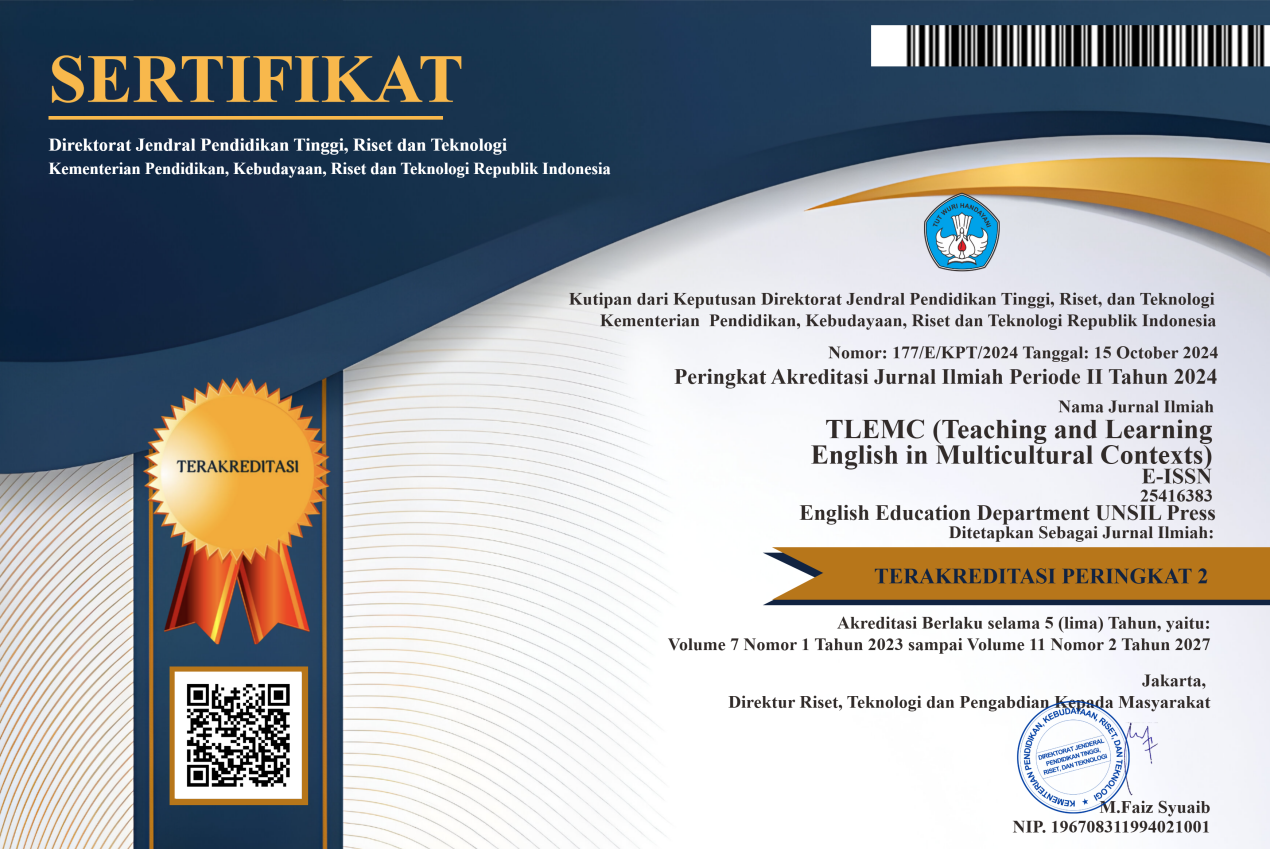Assigning Humorous Recount to Promote Speaking Fluency in Indonesian EFL Classroom
Abstract
The present study investigated the effect of assigning students to orally present their personal humorous recounts on their speaking skills. The results of this study reveal that the participant students at English Study Program of Teachers Training and Educational Sciences, Pattimura University experienced an impressive gain in speaking performance. This quasi-experimental study shows that this approach is effective in encouraging students to use target language more frequently in an unthreatening and fun situation. Thus, provide psychological support for students when they have to use target English language. This strategy provides ways to activate many language elements such as grammar, vocabulary and pronunciation the students have previously learned. The mean score of experiment group’s posttest is 73.89 higher than control group which is 70.71. Students in the experimental group have reported that they were able to alleviate many psychological inhibitors to speaking in public and improved their speaking skill considerably. The observation indicated that the class dynamic was increased. Implication for teaching speaking is further discussed in this article.
Key words: Humor, Speaking, Fluency, EFL, Storytelling.
Full Text:
PDFReferences
Abdulmajeed, R. K., & Hameed, S. K. (2017). Using a Linguistic Theory of Humour in Teaching English Grammar. English Language Teaching, 10(2), 40. https://doi.org/10.5539/elt.v10n2p40
Alhmadi, N. S. (2014). English speaking learning barriers in Saudi Arabia: a case study of Tibah University. Arab World English Journal, 5(2), 38–53.
Alrabai, F. (2014). Motivational practices in English as a foreign language classes in Saudi Arabia: teachers beliefs and learners perceptions. Arab World English Journal, 5(1), 224–246.
Alrabai, F. (2016). Factors Underlying Low Achievement of Saudi EFL Learners. International Journal of English Linguistics, 6(3), 21. https://doi.org/10.5539/ijel.v6n3p21
Banas, J. A., Dunbar, N., Rodriguez, D., & Liu, S. J. (2011). A review of humor in educational settings: Four decades of research. Communication Education, 60(1), 115–144. https://doi.org/10.1080/03634523.2010.496867
Dorneyei, Z. (2007). Research Methods in Applied Linguistics (Oxford Applied Linguistics)-Oxford University Press, USA (2007).pdf.
Husniyah, A. (2019). Investigating demotivational factors in Indonesian EFL classrooms: The case of madrasa students. Studies in English Language and Education, 6(1), 44–60. https://doi.org/10.24815/siele.v6i1.12210
Jellick, M. (2015). Cultural Introductions by Way of Storytelling. English Teaching Forum, 53(3 PG-35–37), 35–37. Retrieved from https://search.proquest.com/docview/1773216368?accountid=10673 NS -
Miao Yee Clare, C., Renandya, W. A., & Qiu Rong, N. (2019). Demotivation in L2 classrooms: Teacher and Learner Factors. LEARN Journal: Language Education and Acquisition Research Network, 12(2), 64–75.
Mokhtar, N. H., Halim, M. F. A., & Kamarulzaman, S. Z. S. (2011). The effectiveness of storytelling in enhancing communicative skills. Procedia - Social and Behavioral Sciences, 18, 163–169. https://doi.org/10.1016/j.sbspro.2011.05.024
Rafada, S., & Madini, A. (2017). Effective Solutions for Reducing Saudi Learners’ Speaking Anxiety in EFL classrooms. Arab World English Journal, 8(2), 308–322. https://doi.org/10.24093/awej/vol8no2.22
Sahar Ali, F. (2018). The Use of Humour in EFL Classrooms: Comparative Conversational Analysis Case Study. Arab World English Journal, 9(2), 262–282. https://doi.org/10.1017/CBO9781107415324.004
Samantaray, P. (2014). Use of Story Telling Method to Develop Spoken English Skill. International Journal of Language & Linguistics, 1(1), 40–44.
Tsiplakides, I., & Keramida, A. (2009). Helping Students Overcome Foreign Language Speaking Anxiety in the English Classroom: Theoretical Issues and Practical Recommendations. International Education Study, 2(4). https://doi.org/10.1163/22116117-90000606
Voss, T., Kunter, M., & Baumert, J. (2011). Assessing Teacher Candidates’ General Pedagogical/Psychological Knowledge: Test Construction and Validation. Journal of Educational Psychology, 103(4), 952–969. https://doi.org/10.1037/a0025125
Wanzer, M. B., Frymier, A. B., Wojtaszczyk, A. M., & Smith, T. (2006). Appropriate and inappropriate uses of humor by teachers. Communication Education, 55(2), 178–196. https://doi.org/10.1080/03634520600566132
DOI: https://doi.org/10.37058/tlemc.v4i2.2051
Refbacks
- There are currently no refbacks.
INDEXED BY:
This work is licensed under a Creative Commons Attribution-NonCommercial-ShareAlike 4.0 International License.
![]()
TLEMC (Teaching and Learning English in Multicultural Contexts)
Program Studi Pendidikan Bahasa Inggris
Fakultas Keguruan dan Ilmu Pendidikan
Universitas Siliwangi
Jl. Siliwangi No. 24 Kota Tasikmalaya - 46115
email: tlemc@unsil.ac.id





